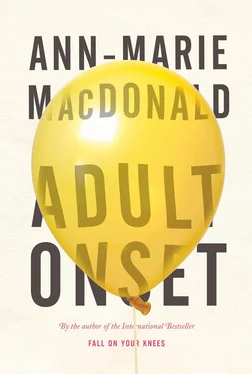“Hi, Mum.”
“You’re there!”
“Yes, how are—”
“What’s wrong?”
“Nothing, I’m—”
“How’re the kids?”
“They’re great, they’re—”
“How’s Hilary?”
“She’s in Winnipeg—”
“What’s she doing there?”
“She’s directing The Importance of —”
“You’re alone with the kids?”
“Well, I’m not really alone—”
“That’s a lot of work for you.”
“Matthew’s at school all morning, it’s just Maggie and—”
“You know you’re not twenty-five, dear.”
“That’s right, Mum, I’m not resenting my children for wrecking my career, I don’t want to go out dancing every night, I’m healthier than I’ve ever—”
“You’re a wonderful mother, doll, you both are—”
“Except I’m old and decrepit—”
“That’s not what I mean, Sadie, Thelma, Minnie, Maureen—”
“Mary Rose.”
“I know, dear, wait now, why did you call me?”
“You called me, Mum.”
“That’s right, now why was that?”
“I don’t know, Mum.”
Silence.
“Dammit, I’ll have to call you back.”
Her mother is the original multi-tasker. She probably has a pot on the stove, a Jehovah’s Witness at the door and a Bell telephone supervisor on hold at that very moment.
“Okay, Mum, have a good—”
Click . Her mother has hung up.
Mary Rose is used to being called by a slew of names before her mother arrives at hers. Sometimes Dolly runs through all six of her own sisters’ names first, including big fat Aunt Sadie, now dead. It is not evidence of dementia, merely a vestige of having grown up somewhat chaotically as one of twelve, herself the child of a child — Mary Rose’s Lebanese grandmother was, despite having been born in Canada, a bride at twelve and a mother at thirteen. Mary Rose’s grandfather had come from “the old country” and brought with him certain “old country” ways. Ibrahim Mahmoud — Abe — entered Canada just before immigration from “Oriental countries” was banned. Indeed, Dolly herself was classified as non-white back in Cape Breton. When, as a young woman in the 1940s, she was poised to enter nurse’s training, she overcame a daunting hurdle — according to Abe nurses were “tramps”—only to face another: the hospital in her home town of Sydney, Cape Breton, in the Canadian province of Nova Scotia, invoked the “colour bar” against her. She went nine miles down the road to New Waterford, where she was deemed white enough to be accepted into training. And met her future husband — it was Duncan’s hometown. Racism is why Mary Rose is here.
Dolly’s fallback has always been to call everyone — everyone female—“doll.” It has occurred to Mary Rose that it is a term of endearment with the potential to double as an aide-mémoire should Dolly ever forget her own name. She returns the phone to its base and washes her hands again. While she has long since enumerated the ways in which she is unlike her mother, only lately has she been struck by the yawning gap between herself and her grandmother: the child bride whom she never met but who loomed large as legend. She grew up with the story: Your grandfather was twenty and your grandmother was twelve when they fell in love and eloped … It is one of several aspects of her family history that Mary Rose has begun to see afresh, as though awakening from an anaesthetic. Perhaps it is a function of having become a mother herself, this reassessment of the tropes and stock accounts of her own childhood: My grandmother was a child … Mary Rose’s mother, by contrast, married at a ripe old twenty-five but still likes to say, “Mumma was good at having babies.” The inference being that she herself was not.
•
December in Winnipeg, 1956.
The sky is huge and grey. The regional bus groans, its exhaust thick with carbon — no one is worried yet, air and water and trees are still in the majority, especially in Canada — and it rocks a little, blindsided by wind at the corner of Portage and Main, before labouring toward the edge of town, leaving behind a modest skyline distinguished by grain elevators at one end and the hospital smokestack at the other. It rolls past a Salvation Army Mission, a tavern with a Ladies and Escorts entrance, past an arena, a cemetery. City outskirts have yet to become franchise strips, people still save money and pay cash for homes, income is not yet disposable, but the boom that will fuel the eventual bust is well under way; factories are humming, employment is high. It doesn’t take long before the big baby-faced bus is pushing between snow-streaked fields of stubble on its way north.
The view from the window is such that the bus might be standing still, so unchanging is the prairie … unless you were born here, in which case it is richly textured and in flux, each field unique beneath the vast overarching sky. But the young woman in the kerchief, seated alone toward the back and staring out the window, is not from here. Like so many nowadays, she is far from home.
She has opened the window a crack — a man who got on back at the arena has lit a cigarette. She has a Hudson’s Bay department store bag on her lap with her purse. She’s big as a house. Second pregnancies can be like that. Her husband is at work in his office on the base. Her three-year-old is with a lady from the Officers’ Wives Club, but she’ll be home in time to cook supper — she has taken a chicken from the freezer, it is thawing in the sink.
The doctor said, “Go home and wait. Come back when the contractions start.”
“When’ll that be?”
“About two weeks. If they don’t start, come in anyway.”
She is a nurse, she knows this.
Before catching this bus back to the air force base at Gimli, she stopped off at the Hudson’s Bay department store — she doesn’t get downtown that often, and it’s right by the doctor’s office. There was a Christmas scene in the window: Santa on a train drinking a Coke. Inside, she bought gloves. They weren’t even on sale. The lady at the counter smiled and said, “Oh, when’re you due?”
“The baby’s dead,” she said.
And the saleslady started crying.
“Don’t cry,” said the pregnant young woman. “I’m not crying, don’t you cry.”
She consoled the saleslady, and bought the gloves to make her feel better.
•
Mary Rose is reaching for her scissors when the phone rings again. She looks longingly at the raw chicken on the counter; at the scissors in their knife block niche; at the illustrated step-by-step surgical guide to dismemberment in her Cooks Illustrated magazine, and picks up. “Hi, Mum.”
“I mailed you a package!” cries Dolly, triumphant.
She pronounces it packeege . Mary Rose has noticed her parents’ accent coming to the fore recently, although it has been more than fifty years since they left Cape Breton Island.
“What’s in it?”
“It’s a surprise.”
A volley of barking reaches Mary Rose from out front.
“What am I hearing?”
“It’s just the dog, Mum.”
“You better go.”
“It’s okay, the gate is closed.”
Another volley. She glances down the hallway and catches sight of a movement through the glass door. “Mum, can you hang on a second?”
“Hang on nuthin’, this is long distance! Call me back. Call collect!”
She hurries toward the door with the phone to her ear in time to see the mailman vaulting backward over the low fence. “Daisy!”
“Hi, Daisy!” hollers her mother all the way from Victoria, British Columbia, into her ear. “It’s Sitdy!” If it were Maggie, Mary Rose would tell her to use her indoor voice, but Dolly doesn’t have one.
Читать дальше












